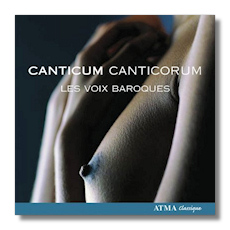
The Internet's Premier Classical Music Source
Related Links
-
M.A. Charpentier Reviews
Lassus Reviews
Marais Reviews
Palestrina Reviews
Purcell Reviews
Schütz Reviews
Tomkins Reviews
Walton Reviews - Latest Reviews
- More Reviews
-
By Composer
-
Collections
DVD & Blu-ray
Books
Concert Reviews
Articles/Interviews
Software
Audio
Search Amazon
Recommended Links
Site News
 CD Review
CD Review
Canticum Canticorum

- Orlando di Lasso: Veni in hortum meum
- Giovanni Pierluigi da Palestrina: Osculetur me osculo oris sui
- Heinrich Schütz:
- Anima mea liquefacta est
- Adjuro vos
- Ego dormio
- Vulnerasti cor meum
- Domenico Mazzocchi: Dialogo della cantica
- Healey Willan:
- Rise Up, My Love, My Fair One
- I Beheld Her, Beautiful as a Dove
- William Walton: Set Me as a Seal upon Thine Heart
- Thomas Tomkins: My Beloved Spake
- Marc-Antoine Charpentier:
- Dilecti mi
- Pulchra es et decora
- Marin Marais: Passacaille
- John Dunstable: Quam pulchra es
- Henry Purcell: My Beloved Spake
Les Voix Baroques/Matthew White, Stephen Stubbs
Atma Classique ACD2-2503 DDD 69:02
All of the music on this CD – with the exception of the Passacaille by Marais, which serves as an unexpected but not unwelcome interlude – is based on texts taken from the Song of Songs, or what also is known as the Song of Solomon. In an excellent accompanying essay, François Filiatrault describes this book's history and significance. Outwardly, the Song of Songs is a paean to profane love, but it usually is interpreted as an allegory about sacred love – God's protective love for mankind, and mankind's longing love for God. This duality allows composers who set these texts to have their cake and to eat it too: they can write sensual, even erotic music while nevertheless fulfilling a sacred purpose. For centuries, composers have looked to the Song of Songs when they wished to honor a marriage. In 1640, Mazzocchi celebrated the union of Paolo Borghese and Olimpia Aldobrandini in his Dialogo della cantica, and almost three centuries later, Walton set portions of the Song of Songs in Set Me as a Seal to celebrate the marriage of Ivor Guest and Mabel Fox-Strangeways.
The earliest work on this CD is by Orlando di Lasso (or Roland de Lassus, as Atma's booklet editor prefers it); his motet Veni in hortum meum dates from 1562. Walton's motet dates from 1938 and is the most recent work here. About half of the works are a cappella, and the other half add at least a basso continuo.(The two works by Schütz, taken from his Symphoniæ Sacræ, feature cornetts, and Purcell's verse anthem adds a fuller complement of strings.) These performances take a fluid and appropriately sensuous approach to the instrumentation of the basso continuo. Directed by lutenist Stephen Stubbs (who also plays Baroque guitar), the ensemble also includes, in addition to the expected strings, harp, harpsichord and organ.
This is felicitous collection of works. Perhaps the most appealing of them is Mazzocchi's motet, which is for soprano, "echo soprano," and four voices. (It doesn't hurt that Dorothee Mields, the soprano soloist, has a voice not unlike that of Emma Kirkby.) The performances tend to emphasize the repertory's similarities, not the differences, though, so I think it is best to take this CD slowly, and to savor it instead of gulping it down. The one-to-a-part performances ensure that even the most potentially tangled passages are clear. Pitch is perfect, and the tone quality is so pure – even chaste! – that no one will have much evidence to argue that these works are too earthly to serve a divine purpose!
Copyright © 2008, Raymond Tuttle




















